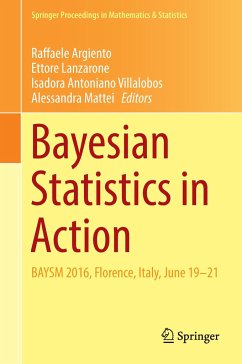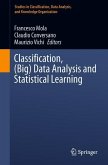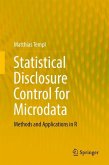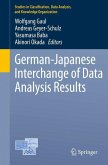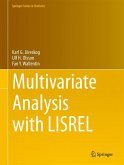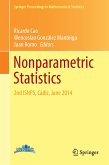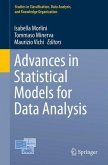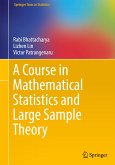Bayesian Statistics in Action
BAYSM 2016, Florence, Italy, June 19-21
Herausgegeben:Argiento, Raffaele; Lanzarone, Ettore; Antoniano Villalobos, Isadora; Mattei, Alessandra
Bayesian Statistics in Action
BAYSM 2016, Florence, Italy, June 19-21
Herausgegeben:Argiento, Raffaele; Lanzarone, Ettore; Antoniano Villalobos, Isadora; Mattei, Alessandra
- Gebundenes Buch
- Merkliste
- Auf die Merkliste
- Bewerten Bewerten
- Teilen
- Produkt teilen
- Produkterinnerung
- Produkterinnerung
This book is a selection of peer-reviewed contributions presented at the third Bayesian Young Statisticians Meeting, BAYSM 2016, Florence, Italy, June 19-21. The meeting provided a unique opportunity for young researchers, M.S. students, Ph.D. students, and postdocs dealing with Bayesian statistics to connect with the Bayesian community at large, to exchange ideas, and to network with others working in the same field. The contributions develop and apply Bayesian methods in a variety of fields, ranging from the traditional (e.g., biostatistics and reliability) to the most innovative ones (e.g., big data and networks). …mehr
Andere Kunden interessierten sich auch für
![Classification, (Big) Data Analysis and Statistical Learning Classification, (Big) Data Analysis and Statistical Learning]() Classification, (Big) Data Analysis and Statistical Learning82,99 €
Classification, (Big) Data Analysis and Statistical Learning82,99 €![Statistical Disclosure Control for Microdata Statistical Disclosure Control for Microdata]() Matthias TemplStatistical Disclosure Control for Microdata60,99 €
Matthias TemplStatistical Disclosure Control for Microdata60,99 €![German-Japanese Interchange of Data Analysis Results German-Japanese Interchange of Data Analysis Results]() German-Japanese Interchange of Data Analysis Results75,99 €
German-Japanese Interchange of Data Analysis Results75,99 €![Multivariate Analysis with LISREL Multivariate Analysis with LISREL]() Karl G. JöreskogMultivariate Analysis with LISREL106,99 €
Karl G. JöreskogMultivariate Analysis with LISREL106,99 €![Nonparametric Statistics Nonparametric Statistics]() Nonparametric Statistics112,99 €
Nonparametric Statistics112,99 €![Advances in Statistical Models for Data Analysis Advances in Statistical Models for Data Analysis]() Advances in Statistical Models for Data Analysis75,99 €
Advances in Statistical Models for Data Analysis75,99 €![A Course in Mathematical Statistics and Large Sample Theory A Course in Mathematical Statistics and Large Sample Theory]() Rabi BhattacharyaA Course in Mathematical Statistics and Large Sample Theory98,99 €
Rabi BhattacharyaA Course in Mathematical Statistics and Large Sample Theory98,99 €-
-
-
This book is a selection of peer-reviewed contributions presented at the third Bayesian Young Statisticians Meeting, BAYSM 2016, Florence, Italy, June 19-21. The meeting provided a unique opportunity for young researchers, M.S. students, Ph.D. students, and postdocs dealing with Bayesian statistics to connect with the Bayesian community at large, to exchange ideas, and to network with others working in the same field. The contributions develop and apply Bayesian methods in a variety of fields, ranging from the traditional (e.g., biostatistics and reliability) to the most innovative ones (e.g., big data and networks).
Produktdetails
- Produktdetails
- Springer Proceedings in Mathematics & Statistics 194
- Verlag: Springer / Springer International Publishing / Springer, Berlin
- Artikelnr. des Verlages: 978-3-319-54083-2
- 1st ed. 2017
- Seitenzahl: 264
- Erscheinungstermin: 29. April 2017
- Englisch
- Abmessung: 241mm x 160mm x 20mm
- Gewicht: 556g
- ISBN-13: 9783319540832
- ISBN-10: 3319540831
- Artikelnr.: 47452609
- Herstellerkennzeichnung Die Herstellerinformationen sind derzeit nicht verfügbar.
- Springer Proceedings in Mathematics & Statistics 194
- Verlag: Springer / Springer International Publishing / Springer, Berlin
- Artikelnr. des Verlages: 978-3-319-54083-2
- 1st ed. 2017
- Seitenzahl: 264
- Erscheinungstermin: 29. April 2017
- Englisch
- Abmessung: 241mm x 160mm x 20mm
- Gewicht: 556g
- ISBN-13: 9783319540832
- ISBN-10: 3319540831
- Artikelnr.: 47452609
- Herstellerkennzeichnung Die Herstellerinformationen sind derzeit nicht verfügbar.
¿Raffaele Argiento is an assistant professor of statistics at the Department of Economic, Social, Mathematical and Statistical Sciences (ESOMAS) of the University of Turin, Italy. He obtained an M.Sc. degree in mathematics from Federico II University, Naples, Italy, in 2000 and a Ph.D. in statistics from Bocconi University, Milan, Italy, in 2007. He is affiliated to the "de Castro" Statistics initiative of the Collegio Carlo Alberto, Turin, Italy. He is a member of the board for the Ph.D. in statistics at Bocconi University. His research focuses on Bayesian parametric and nonparametric methods from both theoretical and applied viewpoints. He is the executive director of the Applied Bayesian Summer School (ABS) and a member of the BAYSM board. Ettore Lanzarone is a researcher at the Institute of Applied Mathematics and Information Technology ``E. Magenes'' (IMATI) at the National Research Council of Italy (CNR) in Milan, Italy. He obtained an M.Sc. degree in biomedicalengineering and a Ph.D. in bioengineering from Politecnico di Milano, Italy, in 2004 and 2008, respectively. He is adjunct professor at the Department of Mathematics of Politecnico di Milano, Milan, Italy, and a collaborating member of the CIRRELT laboratory, Montréal and Quebec City, Canada. His research interests include prediction methods (Bayesian in particular), optimization and operations research, and bioengineering. He is cofounder of the BAYSM conferences and a member of the BAYSM board. Isadora Antoniano-Villalobos is an assistant professor of statistics at the Department of Decision Sciences and a member of the board for the Ph.D. in statistics at Bocconi University, Milan, Italy. She obtained an M.Sc. degree in mathematics from the Universidad Nacional Autónoma de México (UNAM), Mexico City, Mexico, in 2008 and a Ph.D. in statistics from the University of Kent, Canterbury, UK, in 2013. Her research focuses on nonparametric Bayesian models and methods, sensitivity analysis, and extreme value theory. She was chair-elect and chair of the junior section of the International Society for Bayesian Analysis (j-ISBA) in 2014 and 2015-2016. Alessandra Mattei is an assistant professor of statistics at the Department of Statistics, Computer Science, Applications ``G. Parenti'' at the University of Florence, Italy, where she also obtained her M.A. in statistics and Ph.D. in applied statistics. In 2012 she was a research fellow at the Statistical and Applied Mathematical Sciences Institute (SAMSI), NC, USA. She has given short courses in Causal Inference. She is currently associate editor for the Journal of the Royal Statistical Society A. Her research interests include causal inference in experimental and observational studies, Bayesian inference, and inference with missing data problems.
Part I THEORY AND METHODS.- 1 Sequential Monte Carlo methods in random intercept models for longitudinal data.- 2 On the truncation error of a superposed gamma process.- 3 On the study of two models for integer valued high-frequency data.- 4 Identification and Estimation of Principal Causal Effects in Randomized Experiments with Treatment Switching.- 5 A Bayesian Joint Dispersion Model with Flexible Links.- 6 Local posterior concentration rate for multilevel sparse sequences.- 7 Likelihood Tempering in Dynamic Model Averaging.- 8 Localization in High-Dimensional Monte Carlo Filtering.- 9 Linear inverse problem with range prior on correlations and its Variational Bayes. Part II APPLICATIONS AND CASE STUDIES.- 10 Bayesian hierarchical model for assessment of climate model biases.- 11 An application of Bayesian seemingly unrelated regression models with flexible tails.- 12 Bayesian Inference of Stochastic Pursuit Models from Basketball Tracking Data.- 13 Identification of patient-specific parameters in a kinetic model of fluid and mass transfer during dialysis.- 14 A Bayesian nonparametric approach to ecological risk assessment.- 15 Approximate Bayesian Computation Methods in the identification of atmospheric contamination sources for DAPPLE experiment.- 16 Bayesian survival analysis to model plant resistance and tolerance to virus diseases.- 17 Randomization Inference and Bayesian Inference in Regression Discontinuity Design: An application to Italian University grants.- 18 Bayesian methods for microsimulation models.- 19 A Bayesian Model for Describing and Predicting the Stochastic Demand of Emergency Calls.- 20 Flexible Parallel Split-Merge MCMC for the HDP.- 21 Bayesian Inference for Continuous Time Animal Movement Based on Steps and Turns.- 22 Explaining the Lethality of Boko Haram's Terrorist Attacks in Nigeria, 2009-2014: A Hierarchical Bayesian Approach.- 23 Optimizing movement of cooperating pedestrians by exploiting floor-field model and Markov decisionprocess
Part I THEORY AND METHODS.- 1 Sequential Monte Carlo methods in random intercept models for longitudinal data.- 2 On the truncation error of a superposed gamma process.- 3 On the study of two models for integer valued high-frequency data.- 4 Identification and Estimation of Principal Causal Effects in Randomized Experiments with Treatment Switching.- 5 A Bayesian Joint Dispersion Model with Flexible Links.- 6 Local posterior concentration rate for multilevel sparse sequences.- 7 Likelihood Tempering in Dynamic Model Averaging.- 8 Localization in High-Dimensional Monte Carlo Filtering.- 9 Linear inverse problem with range prior on correlations and its Variational Bayes. Part II APPLICATIONS AND CASE STUDIES.- 10 Bayesian hierarchical model for assessment of climate model biases.- 11 An application of Bayesian seemingly unrelated regression models with flexible tails.- 12 Bayesian Inference of Stochastic Pursuit Models from Basketball Tracking Data.- 13 Identification of patient-specific parameters in a kinetic model of fluid and mass transfer during dialysis.- 14 A Bayesian nonparametric approach to ecological risk assessment.- 15 Approximate Bayesian Computation Methods in the identification of atmospheric contamination sources for DAPPLE experiment.- 16 Bayesian survival analysis to model plant resistance and tolerance to virus diseases.- 17 Randomization Inference and Bayesian Inference in Regression Discontinuity Design: An application to Italian University grants.- 18 Bayesian methods for microsimulation models.- 19 A Bayesian Model for Describing and Predicting the Stochastic Demand of Emergency Calls.- 20 Flexible Parallel Split-Merge MCMC for the HDP.- 21 Bayesian Inference for Continuous Time Animal Movement Based on Steps and Turns.- 22 Explaining the Lethality of Boko Haram's Terrorist Attacks in Nigeria, 2009-2014: A Hierarchical Bayesian Approach.- 23 Optimizing movement of cooperating pedestrians by exploiting floor-field model and Markov decisionprocess

